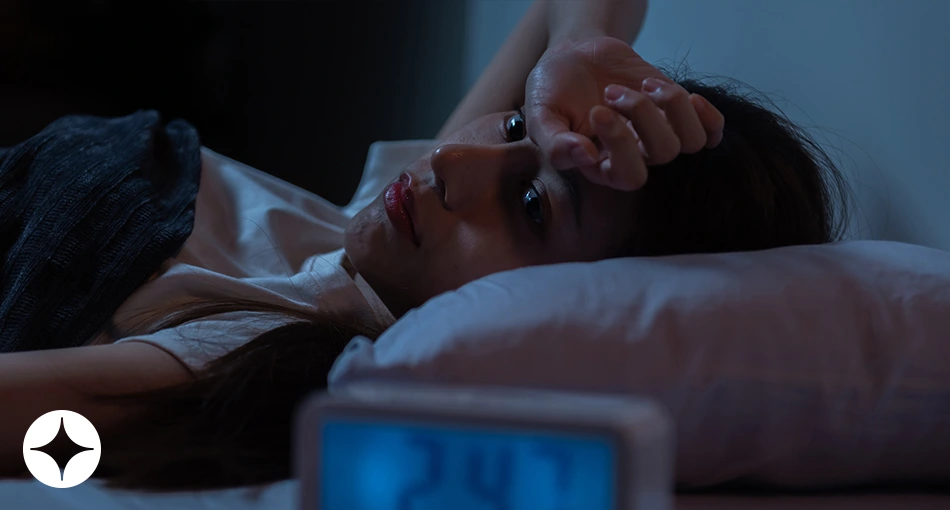
Sleep evades everyone from time to time, and both short-term and long-term insomnia1 — or difficulties falling or remaining asleep2 — is fairly common. People try many remedies to improve their sleep3, from counting sheep4 and using sleep apps5 to dabbing essential oils6 on their pillow, cleaning their bedroom7 and cutting down on caffeine8. Some seek a doctor's guidance, and others try self-medicating, sometimes using melatonin9, recreational weed10 or alcohol as a sleep aid11.
This article considers how effective alcohol is in aiding sleep. While most people know that alcohol can be harmful to overall health12, many readers may be surprised to learn that it's more harmful than good when it comes to getting a good night's rest.
Alcohol and Sleep
Studies indicate that between 20% and 30% of insomnia sufferers turn to alcohol13 in an attempt to get better sleep. However, while many people experience sedative effects of alcohol14 and fall asleep quickly, for others, the stimulatory impacts last longer, keeping them awake. Moreover, regardless of how long it takes someone to drift off, alcohol greatly impacts the quality of sleep.
Alcohol disrupts the body's natural clock, known as the sleep-wake circadian rhythm15, which can cause sleep to end sooner than expected. Some sources report that alcohol also interferes with melatonin release16, a hormone vital for sleep. It can also disturb brain activity, making sleep less restorative. As the effects of alcohol wear off during the night, many people experience restlessness, with periods of interrupted sleep. Additionally, because alcohol is a diuretic17, people may wake more frequently to use the bathroom18 after a heavy night of drinking.
Some studies suggest that alcohol prevents people from getting enough REM sleep19, often referred to as deep sleep. Crucially, REM sleep20 is the most restorative stage of sleep21. Alcohol use or withdrawal can lead to vivid dreams22 or nightmares, which can further disturb people while sleeping. Indeed, consuming even just a few alcoholic beverages can completely disrupt sleep architecture23 for the night.
Alcohol and Sleep Disorders
Because alcohol acts as a muscle relaxant24, it can loosen the throat muscles. This makes it harder for air to reach the lungs and increases the likelihood of snoring. It can also result in slower or shallower breathing25. Imbibing alcohol can worsen sleep disorders26. Worryingly, it can lengthen the time people restart breathing while asleep.
Studies also indicate a causation factor between drinking and disordered sleep27, suggesting that alcohol consumption can actually lead to the development of harmful sleep disorders. When untreated, such sleep disorders can have detrimental impacts28 on both physical and mental health, affect mood and concentration and even shorten life29.
Alcohol and Health
Poor sleep is just one, albeit harmful, side effect of alcohol consumption. Drinking, especially frequently or heavily, has many potential negative impacts on health, including:
- Weakened immune system30
- Increased risk of certain cancers31
- Organ damage32
- Weight gain
- High blood pressure
- Decreased fertility33
- Stroke
- Heart disease
- Depression and anxiety34
If you or a loved one are struggling with alcohol dependency, make an appointment with a health care professional. If you experience frequent bouts of insomnia, you should also seek medical guidance. And, if you're using alcohol as a way to sleep, whether infrequently or often, it's time to find more effective methods of getting a good night's rest.
References
- National Heart, Lung, and Blood Institute – What Is Insomnia?
- Cleveland Clinic - Insomnia
- SoClean – Lesser-Known Habits to Improve Your Sleep – At Any Age
- Reader's Digest – Here's Why People Started Counting Sheep to Fall Asleep
- SoClean – Top Sleep Apps for Improving Your Zzzs
- Verywell Health – Essential Oils That Can Help You Sleep Better
- SoClean – How Clean Air Promotes Good Sleep
- National Library of Medicine – Caffeine Effects on Sleep Taken 0, 3, or 6 Hours before Going to Bed
- SoClean – Is Taking Melatonin Every Night Good or Bad for You?
- Pew Research Center – Most Americans now live in a legal marijuana state – and most have at least one dispensary in their county
- World Health Organization – Alcohol
- National Institute on Alcohol Abuse and Alcoholism – Alcohol's Effects on Health
- National Library of Medicine – Insomnia as a path to alcoholism: tolerance development and dose escalation
- National Library of Medicine – Stimulant and sedative effects of alcohol
- National Institute of General Medical Sciences – Circadian Rhythms
- Piedmont – How does alcohol affect your sleep?
- National Library of Medicine – The Diuretic Action of Weak and Strong Alcoholic Beverages in Elderly Men: A Randomized Diet-Controlled Crossover Trial
- Healthline – Why Does Alcohol Make You Pee?
- National Library of Medicine – Alcohol and the Sleeping Brain
- UCI Health – Why we need REM sleep for health
- National Heart, Lung, and Blood Institute – Sleep Phases and Stages
- Forbes – This Is What Alcohol Does To Your Dreams – According To A Sleep Doctor
- National Library of Medicine – Sleep Physiology
- National Library of Medicine – Alcohol Use Disorders and Their Harmful Effects on the Contractility of Skeletal, Cardiac and Smooth Muscles
- Verywell Health – What's the Link Between Alcohol and Sleep Apnea?
- Mayo Clinic – Sleep Disorders
- National Library of Medicine – Alcohol and the risk of sleep apnoea: a systematic review and meta-analysis
- Johns Hopkins Medicine – The Dangers of Uncontrolled Sleep Apnea
- SoClean – New Research: Sleep Well to Live Longer
- National Library of Medicine – Alcohol and the Immune System
- Cancer Research UK – Alcohol and cancer
- NHS – Alcohol Misuse Risks
- National Institutes of Health – Alcohol and fertility: How much is too much?
- WebMD – What to Know About Alcohol and Mental Health




